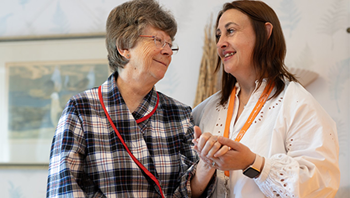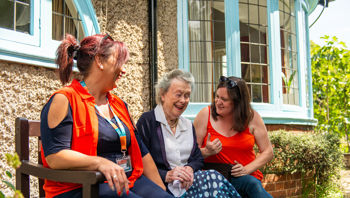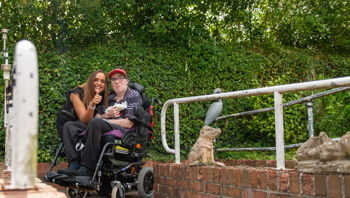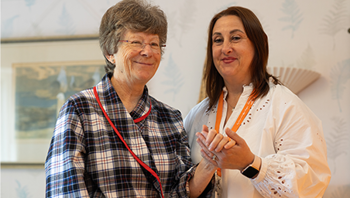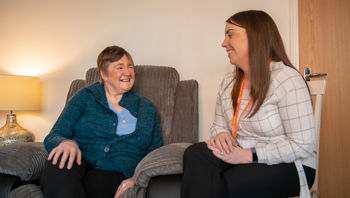How Would I React to a Dementia Diagnosis?
Rebecca explores how personality, communication, and dementia home care can influence your response to a dementia diagnosis. Learn how to navigate this journey.

Published: 09/08/2024
Understanding Dementia
Many of us worry about dementia. It's a topic often discussed in conversations, especially as we age. Early symptoms, like short-term memory loss, can easily be mistaken for simple forgetfulness, something we all experience from time to time. But when these lapses start to become more frequent or noticeable, it’s natural to wonder if something more serious might be at play.
Dementia is a complex condition that affects each person differently. I often discuss this in our dementia awareness sessions. No two people will have the same experience, and that’s important to remember. Whether it's becoming more withdrawn or perhaps more outgoing, how dementia manifests can vary widely.
Initial Reactions to a Dementia Diagnosis
If I were to receive a dementia diagnosis, I imagine the first reaction would be one of shock, even if part of me had been expecting it. After all, acknowledging that something as serious as dementia is affecting you is no small thing. The following feelings might range from fear and sadness to a deep concern about the future.
One of the things I’ve learned from my work at Right at Home Cheshire East is that self-awareness plays a huge role in how someone handles a diagnosis. Some people might choose to face it head-on, wanting to understand every aspect of their condition. Others might prefer to avoid thinking about it too much, focusing instead on maintaining as much normalcy as possible.
The Role of Personality and Pre-Dementia Behaviours
I often think about how my current personality and behaviours would influence my reaction to a dementia diagnosis. For instance, I’ve always enjoyed interacting with others and being active in my community. I believe that if I were diagnosed with dementia, I would want to hold onto those aspects of my life for as long as possible.
On the other hand, I’ve met individuals who were more reserved before their diagnosis, and they often become even more introverted as their dementia progresses. Seeing how our core traits can remain, even as our cognitive abilities change, is fascinating.
The Importance of Open Communication
One thing that stands out to me is the importance of talking about a dementia diagnosis with loved ones. Keeping these fears and concerns bottled up can make the situation feel even more overwhelming. I’ve seen how open conversations can bring relief, helping the individual and their family to come to terms with the diagnosis.
Discussing the diagnosis doesn’t just help with acceptance; it also ensures everyone is on the same page regarding care and support. Communication is key, whether it’s talking about what to expect or making plans for the future.
Supporting Loved Ones Through a Dementia Diagnosis
Supporting someone with dementia is about more than just providing care—it’s about being there emotionally. Families are crucial in helping their loved ones navigate this challenging time. I’ve often seen how families who remain close-knit and supportive can make a world of difference in the well-being of someone with dementia.
At Right at Home Cheshire East, we understand how difficult this time can be for families. That’s why we emphasise the importance of empathy, patience, and continuous dementia support. We’re here to help families every step of the way, offering guidance, care, and reassurance.
How Dementia Home Care Can Help
Dementia home care, specifically Alzheimer's Care, is an invaluable service for those diagnosed with this condition. It allows individuals to remain in the comfort of their own homes, surrounded by familiar sights and sounds. This familiarity can provide immense comfort and help maintain a sense of normalcy.
At Right at Home Cheshire East, our dementia home care services are tailored to meet each individual’s unique needs. We work closely with families to develop a care plan that evolves as the condition progresses, ensuring our clients receive the best care possible.
Facing a dementia diagnosis is undoubtedly challenging, but it doesn’t have to be faced alone. With the right support, open communication, and compassionate care, it’s possible to navigate this journey with dignity and grace.
If you or a loved one are dealing with dementia, remember that help is available. At Right at Home Cheshire East, we’re here to provide the care and support you need.

Angie T | (Daughter-in-law of Client/Service User)" "Excellent service is provided at all levels. Engaging all the time and kept us informed at all times. Confident manner when dealing with the service user. The level of care we received was excellent. Excellent care is given at all times.""
Dementia FAQs
What are the early signs of dementia?
Early signs often include short-term memory loss, confusion, and difficulty with language.
How can dementia home care help?
Dementia home care provides personalised support in the comfort of your own home, helping to maintain independence and quality of life.
Can personality traits influence how someone reacts to dementia?
Yes, pre-diagnosis personality traits can often influence how someone handles their dementia diagnosis.
Why is open communication important after a dementia diagnosis?
Open communication helps ensure everyone is on the same page and can provide emotional support and reassurance.
How can families support a loved one with dementia?
Families can support their loved ones by staying emotionally available, helping with daily tasks, and working closely with care providers.
Our Trusted Services
Families just like yours, trust and rely on Right at Home to provide high-quality homecare services for their loved ones. We offer a wide range of services to support Clients to remain living safely and independently in the comfort of their own home.
